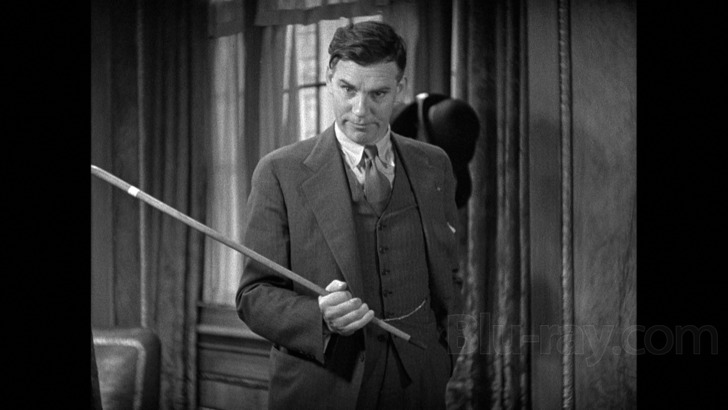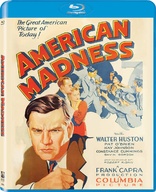American Madness Blu-ray Movie
HomeAmerican Madness Blu-ray Movie 
Sony Pictures | 1932 | 75 min | Not rated | May 19, 2020Movie rating
7.1 | / 10 |
Blu-ray rating
| Users | 0.0 | |
| Reviewer | 3.5 | |
| Overall | 3.5 |
Overview
American Madness (1932)
In the 1930's, the Depression era, and the Board of Directors Thomas Dickson's bank want Dickson to merge with New York Trust and resign. He refuses. One night, Dickson's bank is robbed of $100,000. The suspect is Matt Brown, an ex-convict whom Dickson hired and appointed Chief Teller.
Starring: Walter Huston, Pat O'Brien (I), Kay Johnson, Constance Cummings, Gavin GordonDirector: Frank Capra, Roy William Neill, Allan Dwan
| Drama | 100% |
Specifications
Video
Video codec: MPEG-4 AVC
Video resolution: 1080p
Aspect ratio: 1.33:1
Original aspect ratio: 1.37:1
Audio
English: DTS-HD Master Audio 2.0 Mono
French: Dolby Digital 2.0 Mono
Subtitles
English SDH
Discs
Blu-ray Disc
Single disc (1 BD)
Playback
Region A (B, C untested)
Review
Rating summary
| Movie | 3.5 | |
| Video | 4.0 | |
| Audio | 3.5 | |
| Extras | 2.0 | |
| Overall | 3.5 |
American Madness Blu-ray Movie Review
It's A Wonderful Life: The Early Years.
Reviewed by Jeffrey Kauffman May 22, 2020If you were to ask your ordinary, everyday film fan to name a movie that came out in the 1930s that had “madness” in its title, I’d bet you would get a pretty uniform response: 1936’s hilarious anti-drug propaganda piece Reefer Madness. But four years before that memorable entertainment warned Americans about the horrifying dangers of the "demon weed", none other than Frank Capra offered his own take on what might be thought of as another kind of addiction, namely capitalism itself (or at least its frequent corollary, greed), with American Madness, a story that in at least some ways presages one of Capra’s most famous films from around a decade and a half later, It's A Wonderful Life. In both American Madness and It’s A Wonderful Life, the hero of the film is a well meaning, noble Everyman who runs a bank (yes, in the case of It’s A Wonderful Life, it’s a building and loan, but the underlying plot mechanics are more or less the same). American Madness offers Thomas A. Dickson (Walter Huston) in the place of James Stewart’s iconic George Bailey, but the obstacles each of these characters face to keep their business open in perilous circumstances are very similar if not outright identical.

American Madness was the first collaboration between screenwriter Robert Riskin and Capra, a partnership that would famously go on to offer film fans such well remembered efforts (and in some cases outright classics) as Lady for a Day, It Happened One Night, Broadway Bill, Mr. Deeds Goes to Town, Lost Horizon, You Can't Take It with You and Mr. Deeds Goes to Town (the partnership evidently dissolved acrimonously after Mr. Deeds Goes to Town because Riskin thought Capra was hogging too much of the credit for the films). As I discuss in our Mr. Capra Goes to War: Frank Capra's World War II Documentaries Blu-ray review, the general perception of Capra as a supposed “bleeding heart liberal” is evidently considerably off the mark, and many of the “Everyman” and “community” aspects we regularly consign to Capra’s influence may have actually come from Riskin, who reportedly was an avowed left leaning sort.
This film might not initially seem to be that “Capra-esque” (Mr. Riskin’s contributions notwithstanding) because its ostensible focal character is the owner of a bank (for crying out loud), something that would seem on its face to make Dickson one of “them”, rather than one of “us”, to characterize the way Capra typically tried to get his audiences to identify with various “types”. Frank Capra, Jr. goes into some detail in a supplement included on this release about how his father (and, presumably, Riskin and then Capra, Frances Goodrich and Albert Hackett) based both Dickson and George Bailey on a real life banking magnate named Amadeo Giannini, who founded the Bank of Italy which soon became the Bank of America. Giannini was an outlier in the early 20th century for being willing to lend money to “ordinary Joes” who didn’t have a ton of assets to their name, and who often made their livings with their hands. All of this said, Dickson’s bank in this film is shown to be spectacularly successful despite the threats of the Depression, and some vignettes show how the bank caters to the “little people” without much to their name, other than their dignity, of course. The bank’s success has set its Board of Directors on a quest to sell it, however, something that Dickson resolutely refuses to do.
A number of the employees of the bank, notably head teller Matt Brown (Pat O’Brien), would seem to be more squarely in the mold of the working stiff types that sometimes populate Capra films, and in fact it may be arguable that Matt’s story, which also involves his courtship of Dickson’s secretary Helen (Constance Cummings), is the “real” focus of the film. Things are perhaps a bit overconvoluted once the plot mechanics really kick in, with not just the Board’s machinations creating problems for Dickson, but a robbery (which Brown is accused of masterminding) that creates a “run” on the bank that is more than a bit reminiscent of a similar sequence in It’s A Wonderful Life. An uncredited Sterling Holloway (much later in life famously the voice of Winnie the Pooh) is on hand as another teller who ostensibly provides some comedy relief.
American Madness doesn’t really provide a ton of surprises as it unfolds its tale, as there’s little question a noble sort like Dickson will prevail, and a regular Joe like Matt will certainly escape the accusation that he’s a bank robber (especially considering the fact that the film is completely overt as to whom the villain actually is). There’s some perhaps needless melodrama injected into some already pretty overheated proceedings courtesy of a subplot involving a teller named Cluett (Gavin Gordon), and Dickson’s wife Phyllis (Kay Johnson), but there’s also some cogent commentary on the pathology of rumors getting circulated (and exaggerated) courtesy of a really interesting quasi-montage showing a series of people reacting to the robbery and passing on ever more inflated assessments of the monetary damages. That sequence, along with some other stylistic choices like what Frank Capra, Jr. points out is the rather interesting editing decision to have people already partly through doorways as they enter a scene (rather than showing them actually entering), really helps the film establish some nice momentum despite some aspects that may seem quaint to contemporary eyes.
American Madness Blu-ray Movie, Video Quality 

American Madness is presented on Blu-ray courtesy of Sony Pictures Home Entertainment with an AVC encoded 1080p transfer in 1.33:1. American Madness was released on DVD way back in 2006, and this release doesn't come with any information on the provenance of the master, but I found some online data mentioning a 4K DCP for screenings of this film, so I'm assuming the usually reliable folks at Sony - Columbia have done something newer than the DVD release that this was based on (again, as always with my reviews, if someone has authoritative information, Private Message me and I'll happily update things here). This is another largely stellar looking transfer from Sony, with well resolved grain and some appealing black levels (perhaps just a tad too black at times, as there's some very minor crush when, for example, a bunch of guys in black suits stand next to each other). Detail levels are commendable throughout most of the presentation. There are a couple of kind of wonky looking scenes, one involving the Board, and another involving Cluett, that look considerably more ragged than the bulk of the presentation (see screenshots 18 and 19). There are still some recurrent signs of age related wear and tear despite whatever restoration gauntlet the source element was subjected to. They're typically pretty minor, but still noticeable, as in the speck on Gordon's lip in screenshot 5, or the scratch running through Holloway's head in screenshot 10. My score is 4.25.
American Madness Blu-ray Movie, Audio Quality 

American Madness features a DTS-HD Master Audio 2.0 Mono track that suffices perfectly well, but which can't completely escape the confines of its recording technologies or the ravages of time. There's noticeable hiss and boxiness throughout the track, and the very brief musical moments (opening and closing snippets) sound pretty thin. Dialogue is rendered cleanly, though as Capra, Jr. gets into in the featurette on this disc, this film exploits an almost "Hawksian" tendency toward overlapping dialogue, something that evidently drove the sound recordists on this feature to distraction. The optional subtitles don't always pick up some of this general clamor.
American Madness Blu-ray Movie, Special Features and Extras 

- Commentary by Frank Capra, Jr. and Author Cathrine Kellison
- Frank Capra, Jr. Remembers American Madness (1080i; 25:10) is an appealing featurette that offers not just the insightful comments from Capra, but other notables like Jeanine Basinger. This looks anamorphically stretched to me.
American Madness Blu-ray Movie, Overall Score and Recommendation 

It's interesting to note how the different screenwriters approached their focal hero in American Madness and It's A Wonderful Life. The latter Capra film carefully molds its characterization out of vignettes documenting the sum total of George's life, so that there is an almost unavoidable (and no doubt intentional) connection between him and the viewer. Here in American Madness, there's arguably considerably less of an emotional hook with regard to Dickson, even if he's going through untold tribulations himself, and in fact in some ways it's Matt's story that offers the most impact. Still, this is fascinating early Capra, and some of its stylistic choices are compelling. Technical merits are generally strong, and American Madness comes Recommended.
Similar titles
Similar titles you might also like

Rancho Notorious
Warner Archive Collection
1952

The Noose Hangs High
1948

Cockfighter
1974

No Orchids for Miss Blandish
1948

Odds Against Tomorrow
1959

The Glass Key
1942

Desert Fury
1947

California Split
1974

Diner
1982

Alice Doesn't Live Here Anymore
1974

The Lady Gambles
1949

Storm Warning
Warner Archive Collection
1951

The Gambler
1974

The Great Impostor
1961

711 Ocean Drive
1950

Spin a Dark Web
1956

Pocketful of Miracles
1961

Where the Sidewalk Ends
Limited Edition to 3000 - SOLD OUT
1950

The Case Against Brooklyn
1958

The Killer is Loose
1956
